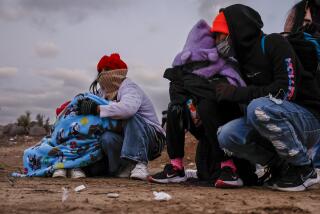Open Wide, Please, and Say ‘Allah’
- Share via
An amulet a day keeps the doctor away. Or: Spread a little of that camel dung on my aching back, please.
U.S. military troops in Saudi Arabia for Operation Desert Shield continue to encounter the difficulties posed by heat, sand, scorpions and cultural differences.
A confidential U.S. military memo being circulated to medical personnel both in Saudi Arabia and stateside, including locally, warns about the differences between the American and Saudi views of health and healing.
For example, don’t expect a blood drive in downtown Riyadh to be very successful:
“A large segment of the population believes that donating blood adversely affects sexuality; this belief greatly impedes efforts to collect blood, even if a relative’s life depends on it.”
Treatment of disease among nomadic tribes still follows “ancient barbaric practices.” To wit:
“For pain relief, the common practice is to apply heat. Hot irons are used to brand infected areas and then hot camel dung is applied. Dental treatment consists of pointed sticks plugged into cavities to relieve toothaches.”
The memo provides strict rules to follow when “treating indigenous personnel in the Persian Gulf area of operations.”
Never touch, speak to or make eye contact with an Arab woman. Never turn off the lights when examining either a man or woman, even to do an eye exam.
Never say admiring things about an Arab child because it might be perceived as an evil gesture. Never remove amulets (usually shaped like an eye or hand) from adults or children.
There has already been one culture clash, the memo says, when an “American female flight line worker scandalized Saudi military personnel by removing her uniform and working in a T-shirt.”
As for U.S. military women, they can forget about sightseeing. The Saudi religious police are ever watchful.
The eyes-only memo notes that there are two ways foreign women are not to be seen in public in Saudi Arabia. If they’re not escorted by men. If they are escorted by men.
Ante Up
It’s in the cards.
As proprietors of city-regulated businesses, the operators of San Diego card rooms have started to contribute to City Council candidates.
On Monday, the council voted 6 to 3 to help card rooms become more profitable by increasing the hourly rate they can charge players.
The move was vigorously opposed by Police Chief Bob Burgreen, who says undercover cops have spotted cheating, bookmaking and drugs at card rooms.
Two of the six council members siding with the card rooms over the police chief have received campaign contributions from card room proprietors: Bob Filner and Abbe Wolfsheimer.
* The San Diego school board race between Scott Harvey and John de Beck should heat up considerably today when the two debate for an hour (11 a.m. to noon) on KSDO radio.
Harvey plans to poke De Beck, a retired teacher, about a commentary he wrote several years ago for the teachers union newsletter.
In it, De Beck endorsed the controversial idea that teachers have the right to strike to resolve contract disputes with the school board.
Full-Time Retiree
Sheriff John Duffy is counting the days until retirement: 82 as of today. He’s also planning to keep busy.
He will be part-time executive director of the National Sheriff’s Institute, an arm of the National Sheriff’s Assn., based in Alexandria, Va. He will organize workshops and seminars.
He’s also going to work with a developer to build a recreational camp in San Diego County for law enforcement personnel and their families.
Duffy says he has three ironclad rules for job offers:
“I don’t want to work for government. I don’t want to work full time. And I don’t want to work with the news media.”
More to Read
Sign up for Essential California
The most important California stories and recommendations in your inbox every morning.
You may occasionally receive promotional content from the Los Angeles Times.










